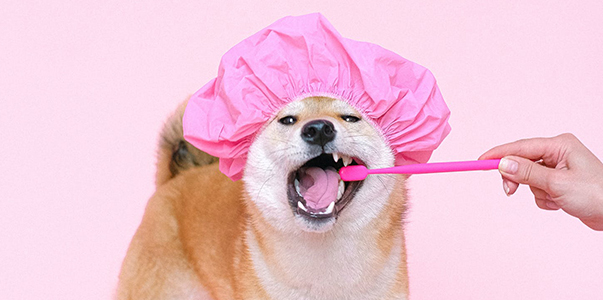If there is one aspect of pet healthcare that is often neglected, it’s dental care. Is it really important to brush your pet’s teeth? The short answer: yes. Good dental hygiene has a radical impact on your pet’s well-being. Here’s what you need to know.

Why is pet dental care important?
One of the most common diseases diagnosed by vets is dental disease and the worst bit? Dental disease is often picked up late as pets aren’t able to show their pain as we do. When picked up late, there isn’t a lot that can be done to relieve or cure it, so preventative care is the best route to take, from an early age.
What are the basics of good dental care?
Keeping your pet’s teeth in tip top shape is easy, especially if you start early when he or she is a puppy or kitten. The key is brushing their teeth often (ideally daily or a minimum of three times a week to make a difference) so that you avoid any plaque build-up.
How do I brush my pet’s teeth?
- Sit behind your pet, with their face looking away from you. Lift the lip with one hand and use the toothbrush with the other.
- Use a pet toothbrush that is suitable for your pet and their breed (small heads and long handles work well for dogs with a long snout like a German Shepherd; a finger brush works for a cat or flat-faced dog). Also use pet toothpaste as it tastes good, contains anti-bacterial agents and has an additional abrasive action. [Remember that human toothpaste can contain fluoride which is highly toxic for pets.]
- If your pet isn’t used to it, start with brushing just one tooth! Eventually you want to get to three brushes, on each side of the month and the front.
- Focus on the teeth at the back – this is where the food gets stuck.
What is the link between plaque build-up and tartar?
Plaque is a result of food that gets stuck in your pet’s teeth. Bacteria in the mouth feed on this food and form plaque. If plaque builds up, it becomes mineralised and hard, forming tartar.
Tartar protects bacteria and creates a rough surface that is easy for food to stick to. It is at this stage that the body’s reaction kicks in, often leading to gingivitis or inflammation of gums, soft tissue damage, infection, abscesses and even bone loss. So the key? Stop the build-up of plaque!
What can I do if my pet hates teeth brushing?
There is good news if you really struggle with brushing your pet’s teeth as help can come in the form of dental care treats and toys – both of which are designed to keep plaque build-up at bay.
Is there anything else I should know about pet dental care?
Aside from brushing your pet’s teeth, there are other factors that contribute to healthy teeth and gums. These include:
- A quality, balanced diet that steers clear of sugar.
- Hide or rubber chews and toys that don’t chip the teeth and destroy the enamel (bones and hooves can cause damage to the teeth and gums).
- Regular vet check-ups. Your vet should always give your pet’s teeth a check – prevention is better than cure!
- Don’t assume ‘bad breath’ is normal. Bad breath can be a sign that something more serious is going on so book in to see your vet.
Can I go to the vet for my pet’s teeth scaling and polishing?
In severe cases, your vet may recommend a full scale and polish (which always has to happen under anaesthetic or sedation. You’ll want to do everything you can to avoid getting to this stage. Professional dental treatment is urgent in severe cases, but our recommendation is to perform a dental scale and polish prophylactically – to prevent dental disease ever becoming severe and the risks that come along with it. Dental health should be assessed with every health check and your vet should advise regarding appropriate preventative measures. Waiting until dental disease is severe before treating it is not fair to your pet as it is a painful disease and can reduce their quality and length of life.
With thanks to our Absolute Pets vet, Dr Cooper, for her advice.
Get in touch
Remember, we are here to help so visit your local Absolute Pets store or get in touch with us online, or on Facebook.
Happy & Healthy
Absolute Pets